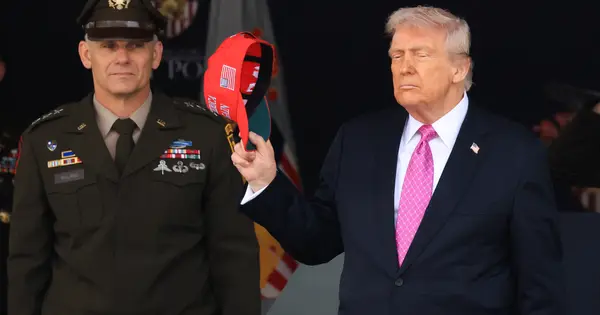Trump's West Point Address: Tech Bragging & a $1 Trillion Defence Pledge - But Does He Really Know What He's Talking About?
)
In a return to the hallowed grounds of West Point, Donald Trump delivered his first military address of 2025, a speech marked by a peculiar blend of confidence and apparent ignorance regarding cutting-edge technology. The former president, known for his unconventional approach to public speaking, sparked considerable discussion with a lighthearted anecdote about acquiring technology he didn't fully understand, specifically referencing stealth planes.
The address, delivered under overcast skies, also highlighted Trump's continued commitment to a robust military budget. He proudly proclaimed a $1 trillion defence spending plan, a figure intended to reassure both allies and potential adversaries of America's unwavering strength. However, the celebratory tone was undercut by moments where his grasp of complex military hardware seemed tenuous, raising questions about the depth of his understanding of the forces he commands.
The Stealth Plane Jibe: A Moment of Confusion?
The most talked-about segment of the speech centered around Trump’s remark about purchasing “very, very sophisticated” technology, including stealth planes, without necessarily knowing how they function. While intended as a self-deprecating joke, the comment quickly went viral, fueling criticism from both sides of the political spectrum. Critics argued that such remarks undermine the seriousness of the military and demonstrate a lack of respect for the expertise of armed forces personnel. Supporters, on the other hand, dismissed the comment as a display of Trump's down-to-earth personality and ability to connect with ordinary Americans.
“I buy technology. I buy the best technology,” Trump asserted. “And I don't even know what it is. I buy it, and it's fantastic. The best. Nobody does it better than me.” This statement, while characteristic of Trump's signature boasting style, prompted scrutiny regarding the implications of a leader making such pronouncements about national security assets.
A $1 Trillion Defence Budget: Justification and Concerns
The announcement of a $1 trillion defence budget was met with a more predictable response. Trump framed the expenditure as essential for maintaining American dominance on the world stage and deterring potential threats. He emphasized the importance of modernizing the military and equipping troops with the latest weaponry. However, the sheer scale of the budget also drew criticism from those who argue that such spending is unsustainable and could be better allocated to domestic priorities like healthcare, education, and infrastructure.
Experts have pointed out that while a large defence budget can provide a significant advantage, it's not a guarantee of military success. Effective strategy, well-trained personnel, and technological innovation are equally crucial. The question remains whether a trillion-dollar budget, coupled with what some perceive as a superficial understanding of military technology, will truly translate into enhanced national security.
Beyond the Headlines: What Does It All Mean?
Trump’s West Point address served as a reminder of his unique communication style and his enduring appeal to a certain segment of the electorate. Whether his remarks about technology were a genuine oversight or a calculated attempt to project an image of relatable leadership remains open to interpretation. Regardless, the address highlighted the ongoing debate about the appropriate level of defence spending and the qualities that define effective leadership in a complex and rapidly changing world. The speech underscored the importance of informed public discourse on matters of national security, urging citizens to critically evaluate the claims made by political leaders and demand greater transparency and accountability from those entrusted with safeguarding the nation.






